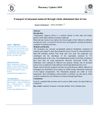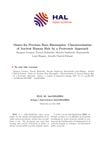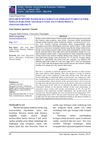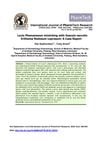Search
for
Sort by
Research
540-570 / 1000+ results
research Dysfunction of Hair Follicle Mesenchymal Progenitors Is Associated with Age-Related Hair Loss
Age-related hair loss is linked to the decline and dysfunction of hair follicle stem cells.

research Advanced Age Impairs Self-Renewal and Biases Fate Choice of Hair Follicle Dermal Stem Cells
Older hair follicle stem cells have a reduced ability to renew themselves, leading to more hair loss.

research Transport of Niosomal Aminexil Through Whole Abdominal Skin of Rats
New niosomal formulation effectively delivers aminexil through rat skin.
research Secreted Carbonic Anhydrase Isoenzyme VI
CA VI helps maintain pH balance and is important for various bodily functions.

research Histopathological Evaluation of the Effect of Low-Level Laser Therapy on Prevention of Hair Follicle Necrosis in Experimental Cryosurgery-Induced Wounds in Rats
Low-power lasers can prevent hair death and increase hair growth in wounds caused by freezing in rats.
research Preparation, Physicochemical and Clinical Evaluation of Aminexil Niosome in Prevention of Androgenetic Alopecia

research Understanding the Functional Contribution of Dermal Stem Cells to Hair Follicle Regeneration and Skin Wound Healing
Dermal stem cells help regenerate hair follicles and heal skin wounds.

research More Than 50 Long-Term Effects of COVID-19: A Systematic Review and Meta-Analysis
COVID-19 leaves 80% of patients with long-term symptoms like fatigue and headaches.

research More Than 50 Long-Term Effects of COVID-19: A Systematic Review and Meta-Analysis
COVID-19 can cause over 50 long-term symptoms, with fatigue and headache being the most common.

research Novel TMEM173 Mutation and the Role of Disease-Modifying Alleles
A new mutation in the STING protein causes a range of symptoms and its severity may be affected by other genetic variations; treatment with a specific inhibitor showed improvement in one patient.

research Histological Assessment of Follicular Delivery of Flutamide by Solid Lipid Nanoparticles: Potential Tool for the Treatment of Androgenic Alopecia
Flutamide, delivered by solid lipid nanoparticles, could potentially treat hair loss.

research Management of Endocrine Disease: Diagnosis and Management of Primary Amenorrhea and Female Delayed Puberty
Primary amenorrhea and delayed puberty in females can be diagnosed and managed effectively.

research Expression of the SCUBE3 Epidermal Growth Factor-Related Gene During Early Embryonic Development in the Mouse
Scube3 gene affects mouse embryo growth in multiple areas, but needs more research.
research Recent Advances in the Characterization of Hair of Mummies from the Chilean Andean Coast
The hair of two ancient Chilean mummies is well-preserved and contains high levels of heavy metals.

research Omics for Precious Rare Biosamples: Characterization of Ancient Human Hair by a Proteomic Approach
The study developed a method to analyze ancient hair proteins using very small samples.

research Non-Scarring Alopecias in Iranian Patients: A Histopathological Study With Hair Counts
The most effective way to diagnose non-scarring hair loss is by transverse sectioning, and some cases, particularly in males with inflammation around hair follicles, might be curable.

research Intermittent Chronic Telogen Effluvium With an Unusual Dermoscopic Finding Following COVID-19
A 17-year-old girl had severe, on-and-off hair loss, likely due to COVID-19. She was treated with Vitamin D3, biotin, and other supplements, and saw some improvement within a month.
research Hair Growth Activity Test of Ethanol Extract Combination of Pandanus Leaves (Pandanus amaryllifolius Roxb.) and Sansevieria Leaves (Sansevieria trifasciata Prain.)
The 3:2 combination of pandanus and sansevieria leaf extracts promotes the best hair growth.

research Comparison of In Vitro Fertilization/Intracytoplasmic Sperm Injection Cycle Outcome in Patients with and without Polycystic Ovary Syndrome: A Modified Poisson Regression Model
Women with PCOS have a similar chance of getting pregnant using assisted reproductive treatment as those without PCOS.

research Androgenic Alopecia Is Associated With Higher Dietary Inflammatory Index And Lower Antioxidant Index Scores
Antioxidant-rich diets may reduce hair loss risk, while pro-inflammatory diets may increase it, especially in women.

research Intermittent Chronic Telogen Effluvium with an Unusual Dermoscopic Finding
A 17-year-old girl has had repeated hair loss since childhood, which can be triggered by infections like COVID-19.

research Effect of Maceration and Soxhletation Methods on the Physical Stability of Hair Tonic Preparation with Ethanol Extract of Mother-in-Law's Tongue (Sansevieria trifasciata P.)
Both extraction methods result in similar physical stability for the hair tonic.

research Lucio Phenomenon Mimicking Vasculonecrotic Erythema Nodosum Leprosum: A Case Report
A man with severe leprosy developed painless ulcers and numbness, treated successfully with multiple drugs and vitamins.
research Characterization of Novel TMEM173 Mutation Causing a Lupus- and SAVI-Like Phenotype, Modified by Polymorphisms in TMEM173 and IFIH1
A new mutation in the STING protein causes a disease with lupus-like symptoms and responds well to a specific inhibitor treatment.
research Evaluation of Hair Growth Activity of Ethanol Extract Combination from Pandanus Leaves (Pandanus amaryllifolius Roxb.) and Sansevieria Leaves (Sansevieria trifasciata Prain.)
The 3:2 combination of pandanus and sansevieria leaf extracts promotes the best hair growth.
research Development of Hair Tonic Combining Ethanol Extracts of Pandan Leaves and Snake Plant Leaves
The 3:2 combination of pandan and snake plant extracts promotes hair growth effectively and is safe to use.
research Disturbed Keratinocyte Differentiation in Transgenic Mice and Organotypic Keratinocyte Cultures Due to Spermidine/Spermine N1-Acetyltransferase Overexpression
Overexpression of SSAT causes hair loss and skin issues, but reducing putrescine can help.

research The Immune Response to COVID-19: Does Sex Matter?
Men and women get COVID-19 at similar rates, but men tend to get sicker and have a higher risk of dying, while women usually have stronger immune responses and vaccine reactions.

research Stable Isotope Analyses of Carbon and Nitrogen in Hair Keratin of Suspected Man-Eating Wolves from the 1880s
The wolves suspected of man-eating in the 1880s likely ate very little human flesh and mostly consumed a diet similar to herbivores and omnivores.